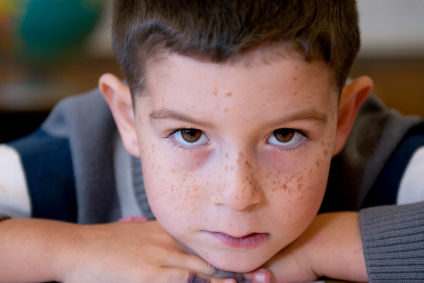
Does My Child Have Dyslexia?
Because dyslexia is primarily associated with difficulty in learning to read, it cannot be reliably diagnosed until your child is the age at which reading typically begins. For most children this happens around the age of six. The following are some common characteristics that may be signs of dyslexia in preschool-age children:
- Jumbling sounds of words in speech, such as saying “pasgetti” for spaghetti” or “mawn lower” for lawn mover.”
- Confusing words signifying direction in space or time, such as “up” and “down,” “in” and “out,” “yesterday” and “tomorrow.”
- Forgetting or confusing the word for known objects, such as “table” or “chair.”
- Delayed speech development.
- Unusual speech patterns, such as frequent hesitations or stammering.
- Difficulty with learning.
- Difficulty remembering and following directions.
- Difficulty learning nursery rhymes and rhyming words.
- Difficulty in learning (and remembering) names of letters.
- Enjoys being read to but shows no interest in letters or words.
- Difficulty with clapping a simple rhythm.
In most cases you will probably not be aware that your child has dyslexia until he is in first or second grade. When reading instruction begins in earnest, your child is likely to lag behind and will begin to show signs of frustration at school. After several months, you may realize that your child simply hasn’t caught on to reading in the same way as his peers. He may still have difficulty recognizing letters of the alphabet, or he may know the letters and their sounds but seem unable to put them together to form even simple words. You may notice that he seems unable to remember words that he has seen before and struggles to sound out every word he sees.
The surest sign of dyslexia is simply the fact that your child seems bright and capable at home and at play, yet he struggles with reading, writing, and spelling. School-aged children with dyslexia will exhibit many of the following symptoms:
- Confusing letters with similar appearances, such as “b” and “d” or “e” and “c.”
- Writing that contains frequent reversals, transpositions, or inversions.
- Difficult remembering common sight words, even after repeated practice.
- Stumbling, hesitating, or making mistakes or omissions when reading small, easy words like “and” or “from.”
- Spelling phonetically and inconsistently such as writing “foniks” for “phonics” or “skul” for “school.”
- Complaining of dizziness, headaches, or stomachaches while reading.
Your first indication that something is wrong may be complaints from your child’s teacher about his behavior and problems he is experiencing at school. Many behavior problems stem from the dyslexia itself; your child’s teacher may complain that he doesn’t pay attention or follow directions, or that he is slow to complete class work. These issues may be the direct result of your child’s confusion and inability to understand much of what is going on around him. Other behavior problems may be deliberate and could be an expression of his frustration and anger; he may intentionally try to disrupt the class to create distractions so as to avoid having to complete his work. He would rather be known as the class clown than the class “dummy.” He may even want to incur punishment, if punishment means being sent to sit in the hallway or principal’s office. To a child with dyslexia, such punishment can be a welcome reprieve from the torture of the classroom. Some common behavior problems that your child’s teacher may report are:
- Laziness, carelessness, or immaturity
- Daydreaming
- Disruptive behavior
- Being easily distracted
- Resistance to following directions
- Reluctance to work on assignments
If you suspect that your child has dyslexia, you will want to seek testing and a diagnosis. Diagnostic testing will help you better understand your child and may guide you to make better choices. Ideally, testing should give you a map of your child’s strong and weak points, and a set of recommendations as to how best to meet his educational needs.
_________________________________________________________________________________________________________
Karina Richland, M.A. is the Founder of PRIDE Learning Centers, located in Los Angeles and Orange County. Ms. Richland is a Certified reading and learning disability specialist. Ms. Richland speaks frequently to parents, teachers, and professionals on learning differences, and writes for several journals and publications. You can visit the PRIDE Learning Center website at: www.pridelearningcenter.com
